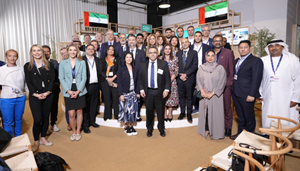Decarbonization alliance commits to reducing emissions by over 50% by 2030
(WO) – Over 60 top executives and knowledge partners of the Alliance for Industry Decarbonization (AFID) held a roundtable at COP28 on Dec. 5 and committed to raising decarbonization ambitions through tangible achievements by 2030. IOCs ExxonMobil and Chevron do not appear to be part of the initiative, having opted-out of the World Banks’ Global Flaring and Methane Reduction Partnership.
Members of AFID have individual reduction plans that aim to reduce 51% of direct and indirect greenhouse gas (GHG) emissions and grow the installed renewable capacity from 84 gigawatts (GW) today to 187 GW in 2030.
Moreover, Alliance members also commit to almost double installed green hydrogen, drive green energy solutions, increase workforce re-skilling from currently 15% to 91% and significantly boost investments in energy transition projects to more than $50 billion by the end of this decade.
Joint achievements and targets will be reviewed on an annual basis to ensure significant progress towards net-zero. AFID also calls on governments to create enabling policies, regulations and incentives that support emission cuts, facilitate transition towards a low-carbon economy and to invest in clean energy and sustainable technologies.
The objective of AFID is to facilitate dialogue on industry level and increase cooperation to help companies to develop solid decarbonization strategies and implementation plans, aligned with their countries’ Paris Agreement net-zero and decarbonization ambitions.
The growing number of members and knowledge partners joining the Alliance highlights that an international, multi-stakeholder platform enabling exchange and collaboration to tackle the decarbonization of the industrial sector is gaining momentum.
Since its launch in 2022, the Alliance grew to 50 companies and 13 eco-system knowledge partners: Siemens Energy, Enel Green Power, TAQA Arabia, Eni, Technip Energies, EDF Renewables, JSW, Tata Steel, Sable Chemicals, Tatanga Energy, Repsol, Equinor, TAQA, OQ, KIS Group, VALE, ATC Development, Subsea7, El Sewedy Electric, Roland Berger, FLSmidth, State of Green, Envision, Alfanar, Zahid Group, Petronas, Ecopetrol, Unilever, TUV SUD, IEC, Orbital Energy, ISO, Kent, Electrified Thermal Solutions, UNIDO, Engie, Lekela Egypt Management Services, Gulf Cryo, BXVentures, Global Renewables Alliance, Bureau Veritas, Emirates Development Bank, EURELECTRIC, KROHNE, Nuventura, Enova, SLB, HIF Global, IRENA, Snam, Net Zero Think Private Limited, APChemi, IFC, Aquatech, Xodus, Standard Chartered, ABB, ERM, Emirates Steel, Mission Innovation, ADNOC, GreenEarthX and Topsoe.
The Alliance serves as a global platform for enhancing dialogue through exchange of insights, experiences, and best practices. The group focuses on five pillars and enablers: renewables, green hydrogen, bioenergy with Carbon Capture, Utilization and Storage (CCUS), human capital, and finance.
IRENA acts as the Secretariat of the Alliance. Siemens Energy and Tata Steel co-chair the Alliance leadership.



